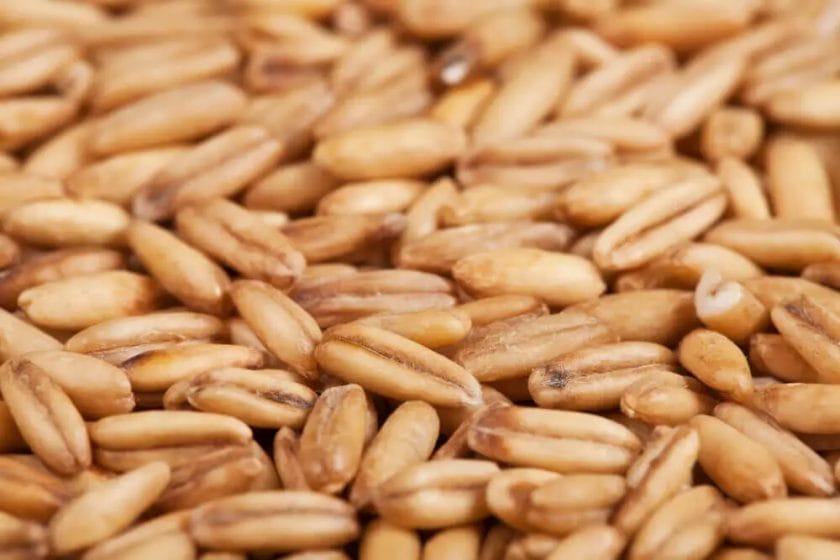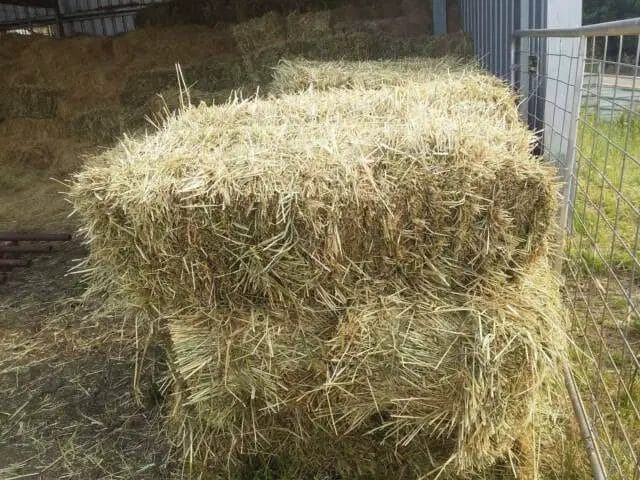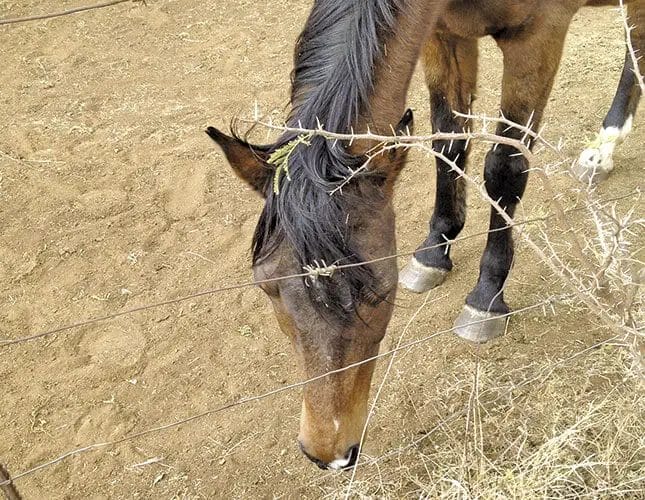Oat hay is a nutritious and popular feed option for horses. With its high fiber content and low protein levels, oat hay provides a balanced diet for equines. It is known to support healthy digestion and provide sustained energy. Additionally, oat hay is less likely to cause digestive issues compared to other types of hay. If you’re looking for a quality forage choice for your horses, oat hay is definitely worth considering!

How Oat Hay Improves Digestion in Horses
Oat hay is a beneficial forage option for horses, offering numerous advantages for their digestive system. In this section, we will explore how oat hay helps improve digestion in horses and why it is a popular choice among horse owners.
1. High Fiber Content
Oat hay is rich in fiber, which plays a crucial role in promoting healthy digestion in horses. Fiber is a complex carbohydrate that cannot be digested by horses but is essential for maintaining a healthy gut. When horses consume oat hay, the fiber content helps stimulate the digestive system and keeps it functioning optimally.
The high fiber content in oat hay also aids in preventing digestive issues such as colic and gastric ulcers. It promotes the movement of food through the digestive tract, preventing blockages or impactions.
2. Nutrient-Rich
Oat hay is not only high in fiber but also contains a range of essential nutrients that support overall equine health. It is a good source of vitamins, including vitamin A, vitamin D, and vitamin E, which are vital for optimal digestion. These vitamins play key roles in maintaining healthy mucous membranes and enhancing the absorption of nutrients.
Additionally, oat hay is a rich source of minerals such as calcium, phosphorus, and magnesium, all of which contribute to a healthy digestive system. These minerals aid in enzymatic reactions and promote proper muscle function within the digestive tract.
3. Good Digestibility
Oat hay has a high digestibility rate, meaning that horses can efficiently break down and absorb the nutrients present in this forage. This is essential for maintaining a healthy weight and preventing nutrient deficiencies in horses.
Due to its good digestibility, oat hay is often recommended for horses with digestive issues or those in need of weight gain. It provides them with easily accessible nutrients, allowing for improved overall digestion and nutrient absorption.
4. Promotes Chewing and Salivation
Horses have a natural grazing behavior, and providing them with oat hay helps simulate this behavior. Chewing on hay promotes the production of saliva, which is beneficial for digestion. Saliva contains bicarbonate, which helps neutralize stomach acid and maintains a healthy pH level in the digestive tract.
By encouraging horses to chew on oat hay, it helps prevent conditions such as gastric ulcers, as the increased saliva production aids in buffering stomach acid.
5. Palatability
Another advantage of oat hay is its palatability. Horses generally find oat hay more appealing compared to other forages, which encourages them to consume an adequate amount of roughage. This is particularly beneficial for horses with picky eating habits or those recovering from illness or surgery, as it ensures they receive the necessary nutrients for proper digestion and overall well-being.
In summary, oat hay offers several benefits for improving digestion in horses. Its high fiber content, nutrient-rich composition, good digestibility, promotion of chewing and salivation, and palatability make it an excellent choice for maintaining a healthy digestive system in horses.

The Importance of Quality Oat Hay for Horse Health
Oat hay is a popular forage option for horses due to its nutritional value and palatability. Horses require a high-fiber diet to support proper digestion and overall health, and oat hay provides an excellent source of fiber. However, not all oat hay is created equal, and it is essential to ensure that the hay you feed your horse is of high quality to maintain their optimal health and well-being.
Here are some key reasons why quality oat hay is crucial for your horse:
1. Nutritional Value
High-quality oat hay is rich in essential nutrients that are vital for your horse’s overall health and performance. It contains a balanced combination of protein, carbohydrates, vitamins, and minerals that can contribute to a well-rounded equine diet. Oat hay is particularly beneficial for horses that require additional energy, such as working horses, growing foals, or pregnant mares.
2. Digestive Health
Horses have a delicate digestive system that relies on the continuous intake of fiber to function properly. Quality oat hay provides the roughage necessary to support efficient digestion and prevent common digestive issues, such as colic and gastric ulcers. The long stems and fibrous nature of oat hay stimulate proper chewing and saliva production, aiding in the breakdown of food and preventing the buildup of harmful bacteria in the gut.
3. Hydration
Adequate hydration is crucial for equine health, and high-quality oat hay can contribute to your horse’s water intake. Soaking oat hay before feeding can increase its moisture content, helping to maintain your horse’s hydration levels. This is particularly important during hot weather or for horses with specific hydration needs.
4. Weight Management
For horses that need to manage their weight, quality oat hay can be an excellent option. It provides the necessary roughage and bulk to keep horses feeling satisfied while maintaining a controlled calorie intake. Oat hay can help prevent obesity and related issues, such as insulin resistance and laminitis.
5. Palatability
Horses are selective eaters, and the palatability of their forage can significantly impact their appetite and overall nutrition. High-quality oat hay is known for its sweet aroma and fine texture, making it highly desirable for most horses. When horses enjoy their forage, they are more likely to consume the recommended amount and benefit from its nutritional value.
In summary, providing your horse with high-quality oat hay is essential for maintaining their overall health and well-being. Quality oat hay offers a balanced nutritional profile, supports optimal digestion, aids in hydration, helps manage weight, and enhances palatability. By choosing the best oat hay for your horse, you can ensure they receive the necessary nutrients and fiber required for a healthy and happy life.

4. Incorporating Oat Hay into a Balanced Equine Diet
Feeding horses a well-balanced diet is essential for their overall health and performance. One important component of a horse’s diet is forage, which provides necessary fiber and nutrients. Oat hay is a common forage option that can be incorporated into a balanced equine diet.
Oat hay is made from the top portion of oat plants, including the seed heads and leaves. It is typically harvested when the plants are in the early stages of seed development, ensuring that the hay has optimal nutritional value. Oat hay is rich in fiber, protein, vitamins, and minerals, making it a nutritious choice for horses.
Nutritional Benefits of Oat Hay
Oat hay provides several key nutrients that are beneficial to horses:
- Fiber: Oat hay is high in fiber, which aids in digestion and helps maintain a healthy gut. Adequate fiber intake is crucial for preventing digestive issues such as colic and promoting regular bowel movements.
- Protein: Oat hay contains a moderate amount of protein, which is essential for muscle development, tissue repair, and overall growth. This is particularly important for performance horses or those in intense training.
- Vitamins and Minerals: Oat hay is a good source of vitamins A, B, and E, as well as minerals such as calcium, phosphorus, and potassium. These nutrients support various bodily functions, including immune function, bone health, and electrolyte balance.
Incorporating Oat Hay into the Diet
When incorporating oat hay into a horse’s diet, it is important to consider their individual needs and overall diet plan. Here are some tips for effectively incorporating oat hay into a balanced equine diet:
- Consult with a Veterinarian or Equine Nutritionist: Before making any changes to your horse’s diet, it is recommended to seek professional advice. A veterinarian or equine nutritionist can assess your horse’s specific needs and provide tailored recommendations.
- Gradual Introduction: Introduce oat hay gradually to allow for proper digestion and minimize the risk of digestive upset. Start by replacing a small portion of the existing forage with oat hay and gradually increase the amount over several days or weeks.
- Monitor Body Condition: Regularly assess your horse’s body condition to ensure they are maintaining a healthy weight. Adjust the amount of oat hay accordingly to prevent weight gain or loss.
- Balancing Nutrient Intake: Oat hay should be combined with other forage sources, such as grass hay or alfalfa, to provide a well-rounded diet. This allows for a balanced intake of fiber, protein, vitamins, and minerals.
- Consideration for Special Needs: Certain horses, such as those with metabolic disorders or dental issues, may require special considerations when incorporating oat hay. Consult with a professional to determine the best approach for your horse.
Oat hay can be a valuable addition to a horse’s diet, providing essential fiber, protein, vitamins, and minerals. However, it is crucial to incorporate it into a balanced equine diet and consider the individual needs of each horse. Consulting with a veterinarian or equine nutritionist is recommended to ensure optimal nutrition and overall health for your horse.
5. Tips for Properly Storing and Feeding Oat Hay to Horses
Oat hay is a popular forage option for horses due to its nutritional value and palatability. It is important for horse owners and caretakers to properly store and feed oat hay to ensure the health and well-being of their equine companions. Here are some useful tips to follow:
1. Proper Storage
When it comes to storing oat hay, it is essential to create a well-ventilated and dry environment. Moisture can lead to mold growth, which can be harmful to horses. Here’s what you can do:
- Find a covered storage area, such as a barn or shed, to protect the hay bales from direct exposure to rain or snow.
- Elevate the hay bales off the ground using pallets or hay racks to prevent moisture absorption from the floor.
- Avoid stacking hay bales too tightly, as this can restrict airflow and increase the risk of mold development. Leave some space between each bale for ventilation.
- Regularly inspect the hay bales for signs of mold, discoloration, or unusual odor. Remove any damaged bales immediately to prevent contamination.
- Consider using a moisture meter to monitor the moisture content of the hay. Ideal moisture levels should be below 15% to prevent mold growth.
2. Quality Assessment
Prior to feeding oat hay to your horses, it is essential to assess the quality of the hay. This will ensure that your horses receive a nutritious and safe feed. Here’s what you should consider:
- Check for mold, dust, weeds, and other contaminants in the hay. These can negatively impact your horse’s health and should be avoided.
- Inspect the color and smell of the hay. High-quality oat hay should have a greenish color and a fresh, sweet smell.
- Assess the overall leafiness and stem-to-leaf ratio of the hay. Leafier hay indicates higher nutritional content and palatability.
- Consider sending a sample to a reputable laboratory for a nutritional analysis. This will help you determine the hay’s protein, carbohydrate, and mineral content.
3. Feeding Guidelines
Feeding oat hay to horses should be done carefully to prevent digestive issues and ensure proper nutrient intake. Follow these guidelines:
- Introduce the oat hay gradually into your horse’s diet to allow their digestive system to adjust. Start with small amounts and gradually increase over several days.
- Provide sufficient clean water at all times to prevent dehydration and aid in digestion.
- Monitor your horse’s body condition and adjust the amount of hay accordingly. Overfeeding can lead to weight gain, while underfeeding can result in nutrient deficiencies.
- Consider feeding oat hay in combination with other forages, such as grass hay or alfalfa, to provide a balanced diet.
- Divide the daily hay ration into multiple feedings to mimic the natural grazing behavior of horses and promote optimal digestion.
In summary, proper storage and feeding of oat hay are crucial for the health and well-being of horses. Follow these tips to maintain the quality of the hay and ensure your horses receive a nutritious and safe feed. Remember to regularly inspect the hay for any signs of mold or contaminants and adjust the feeding amounts based on your horse’s individual needs.
FAQs
Is oat hay good for horses?
Oat hay can be a good source of fiber and nutrients for horses. It is commonly fed to horses as a forage option. However, it is important to ensure that oat hay is of good quality and free from mold or dust. It is recommended to consult with a veterinarian or equine nutritionist to determine the appropriate feeding plan for your horse.
Final Thoughts
In conclusion, oat hay can be a beneficial and nutritious feed option for horses. It provides essential nutrients such as protein, fiber, and energy to support their overall health and well-being. The high fiber content promotes proper digestion and can help prevent digestive issues in horses. Additionally, oat hay is generally palatable to horses, making it an appealing choice for picky eaters. However, it’s important to consider the individual needs and condition of each horse before incorporating oat hay into their diet. Consulting with a veterinarian or equine nutritionist can help ensure the proper feeding regimen for your horse’s specific requirements.
